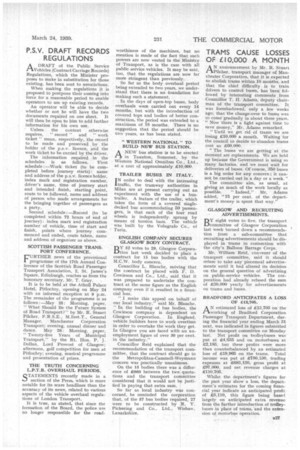P.S.V. DRAFT RECORDS REGULATIONS
Page 53

If you've noticed an error in this article please click here to report it so we can fix it.
A DRAFT of the Public Service .1-1‘Vehic1es (Contract Carriage Records) Regulations, which the Minister proposes to make in substitution for those existing, has been sent to associations.
When making the regulations it is proposed to postpone their coming into force for a reasonable period to enable operators to use up existing records.
An operator will be able to decide whether or not he will have the two documents required on one sheet. It will then be open to him to add further information for his own use.
Unless the context otherwise requires, " record " and " work ticket " mean, respectively-, the record to be made and preserved by the holder of the p.s.v. licence, and the work ticket to be carried by the driver.
The information required in the schedules is as follows. 'First schedule :—Work ticket (to be completed before journey starts): name and address of the p.s.V. licence holder, index mark and registration number, driver's name, time of journey start and intended finish, starting point, route to be followed, name and address of person who made arrangements for the bringing together of passengers as a party.
Second schedule :—Record (to be completed within 72 hours of end of journey): index mark and registration number of vehicle, time of start and finish, points where journey commenced and ended, route taken, name and address of organizer as above.
SCOTTISH PASSENGER TRANSPORT CONFERENCE.
FURTHER news of the provisional programme of the 17th Annual Conference of the Scottish Road Passenger Transport Association, 2, St. James's Square, Edinburgh, reaches us from the
honorary secretary, Mr. T. Gray.
It is to be held at the Atholl Palace Hotel, Pitlochry, opening on May 24 with an informal reception at 9 p.m. The remainder of the programme is as follows :—May 25: Morning, paper, " What Should Be the Future System of Road Transport?" by Mr. R. Stuart Pilcher, F.R.S.E., M.Inst.T., General Manager, Manchester Corporation Transport; evening, annual dinner and dance. May 26: Morning, paper, " Twenty-five Years of Municipal Transport," by the Rt. Hon. P. J. Dalian, Lord Provost of Glasgow; afternoon, golf competition for men at Pitlochry; evening, musical programme and presentation of prizes.
THE TRUTH CONCERNING L.P.T.B. OVERHAUL PERIODS.
QTATEMENTS recently made in a
section of the Press, which is more notable for its scare headlines than the accuracy of its news, related to various aspects of the vehicle overhaul regulations of London Transport.
It is true, as stated, that since the formation of the Board, the police are no longer responsible for the road
worthiness of the machines, but no mention is made of the fact that such powers are now vested in the Ministry of Transport, as is the case with all public service vehicles. It may be said, too, that the regulations are now far more stringent than previously.
So far as the body overhaul period being extended to two years, we understand that there is no foundation for making such a statement.
. In the days of open-top buses, body overhauls were carried out every 14 months; but with the introduction of covered tops and bodies of better construction, the period was extended to a maximum of 18 months, There is no suggestion that the period should be two years, as has been stated.
" WESTERN NATIONAL" TO BUILD NEW BUS STATION.
ANEW bus station is to be erected in Taunton, Somerset, by the Western National Omnibus Co., Ltd., at a cost of approximately £10,000.
TRAILER BUSES IN ITALY.
IN order to deal with the increasing traffic, the tramway authorities in Milan are at present carrying out an experiment with the use of a bustrailer. A feature of the trailer, which takes the form of a covered singledecked bus accommodating 50 passengers, is that each of the four road wheels is independently sprung by means of torsion bars. The vehicle was built by the Volugrafo Co., of Turin.
ENGLISH COMPANY SECURES GLASGOW BODY CONTRACT.
BY 52 votes to 29, Glasgow Corporation last week decided to place a contract for 15 bus bodies with the M.C.W. body concern.
Councillor L. Blanche, moving that the contract be placed with F. D. Cowieson and Co., Ltd., said that it was prepared to undertake the contract at the same figure as the English company even if it resulted in a financial loss.
"I make this appeal on behalf of our local industry," said Mr. Blanche. " In the building of bus bodies, the Cowieson company is dependent on Glasgow Corporation. In England, vehicle builders have to work overtime in order to overtake the work they get. In Glasgow you are faced with an unemployment figure of over 30 per cent, in the industry."
Councillor Reid explained that the recommendation of the transport committee, that the contract should go to the Metropolitan-Cammell-Weymann concern was practically unanimous.
On the 15 bodies there was a difference of £960 between the two quotations and the transport committee considered that it would not be justified in paying that extra sum.
So far as local industry was concerned, he reminded the corporation that, of the 57 bus bodies required, 27 were to be constructed by R. Y. Pickering and Co., Ltd., Wishaw, Lanarkshire.




















































































